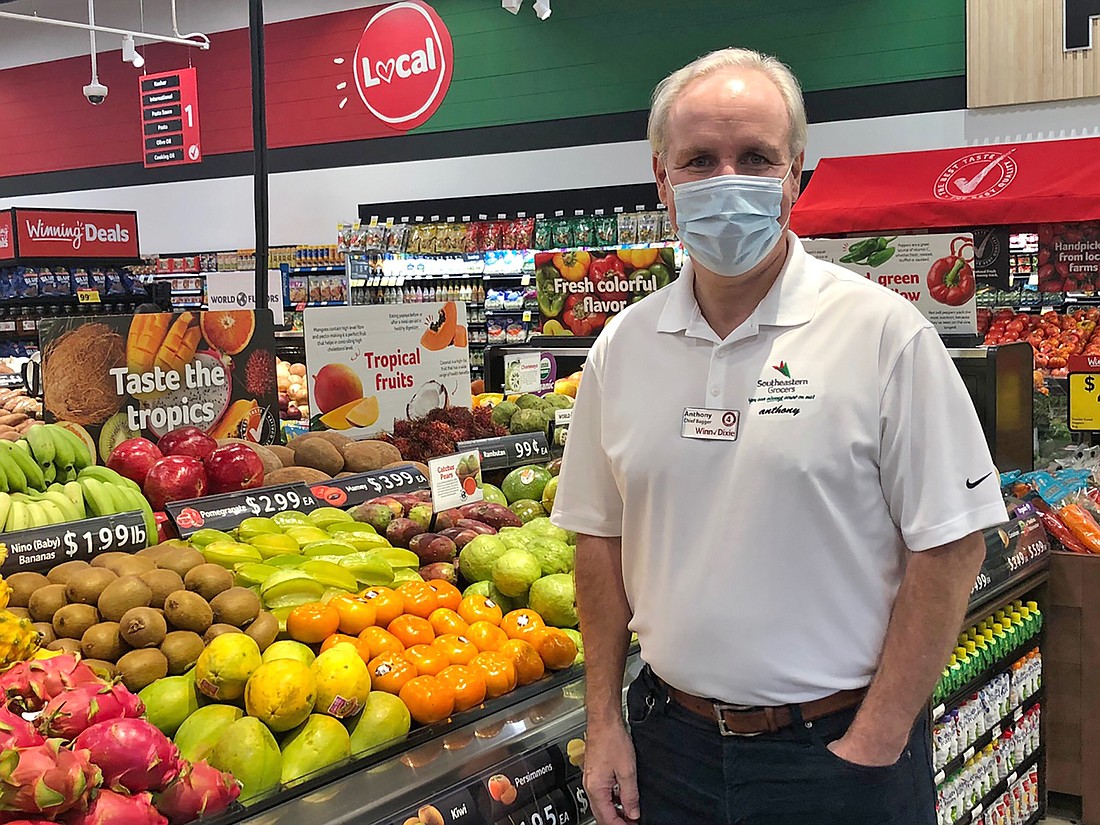
The COVID-19 pandemic has been devastating to many business sectors but at least one industry is thriving: grocery stores.
Sales at supermarket chains have surged this year as more consumers eat meals at home, and some analysts say the trend will have a lasting impact on the industry.
Southeastern Grocers Inc. CEO Anthony Hucker agrees.
“The American kitchen light has been turned on,” Hucker said in an interview Nov. 10 at the company’s new Winn-Dixie supermarket in Mandarin.
“Millions of American chefs were created overnight.”
Those chefs may have been created out of necessity but Hucker believes many are finding the experience so enjoyable they will continue cooking at home even as restaurants fully reopen.
“People have been rejuvenated when it comes to cooking,” he said.
Jacksonville-based Southeastern Grocers operates supermarkets under the Winn-Dixie, Harveys and Fresco y Mas banners.
The company reported sales at stores open for more than one year jumped 18.4% in the first half of this year, a similar trend to other grocery chains.
Hucker said Southeastern Grocers saw the impact as soon as pandemic-related lockdowns began in mid-March.
“Friday the 13th (of March) became one our largest sales days in the history of the company,” he said.
Hucker thinks the store that opened Nov. 11 in the Mandarin South Shopping Center at 11700 San Jose Blvd. will appeal to those new chefs.
The store replaces a Winn-Dixie that was on the other side of the street, but Hucker believes the new store on the southbound side, south of Interstate 295, will be convenient for many shoppers.
“We thought this was a much better location,” he said.
“It’s on the going-home side.”
It's also a homecoming for Winn-Dixie, which operated in the space before relocating to the larger store across the street in 1995. That closed Nov. 1 and the supermarket moved back to Mandarin South into a former Earth Fare.
Hucker cited customer research that shows 62% of consumers make decisions on what to have for dinner after 4 p.m., as they are going home from work. He expects many to stop in to the new Winn-Dixie on their evening commute.
Southeastern Grocers is owned by a group of private investment firms but it announced plans in September for an initial public offering.
The Securities and Exchange Commission mandates a quiet period for companies preparing to sell stock, so Hucker could not say much about the pending IPO.
“The shareholders think this was a good opportunity,” he said.
“It provides liquidity for the stock.”
The company’s preliminary registration statement for the IPO does not say who the shareholders are. Southeastern Grocers has been owned by a group of investment firms that received stock in exchange for debt in a prepackaged Chapter 11 bankruptcy reorganization two years ago.
Southeastern Grocers has been operating a fourth supermarket chain, Bi-Lo, but the company announced plans this year to sell 85 stores and exit that brand.
The IPO filing said those sales leave the company with 420 supermarkets in Florida, Georgia, Alabama, Louisiana and Mississippi.
However, the company is expanding the Winn-Dixie chain. The Mandarin store is one of four Florida locations opening Nov. 11 and it plans to open four more later this year and in early 2021.
With news of a COVID-19 vaccine possibly becoming available in early 2021, Hucker is optimistic about Southeastern Grocers’ future as the country settles into a “new normal” of post-pandemic eating habits.
“It may not be the beginning of the end but it might be the end of the beginning,” he said.